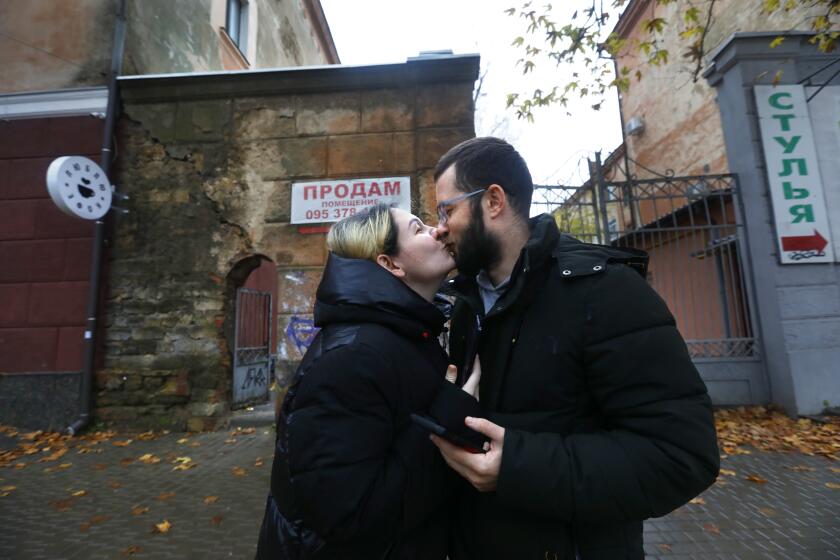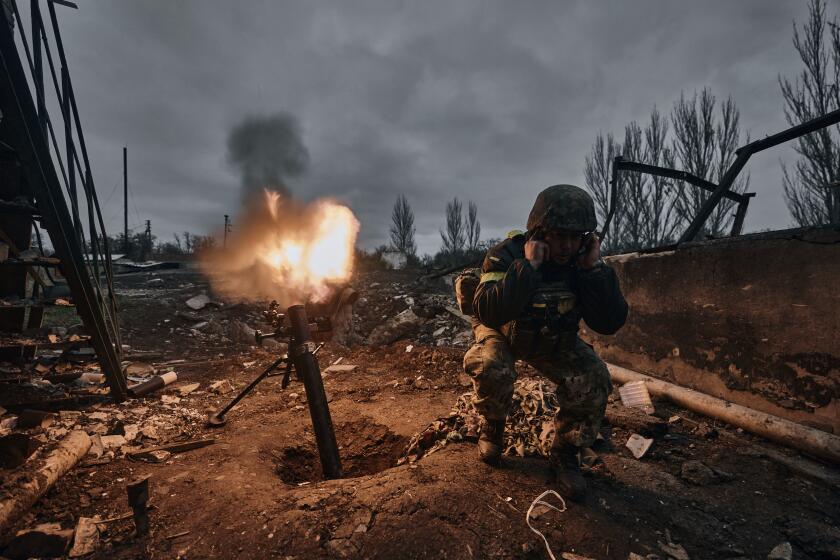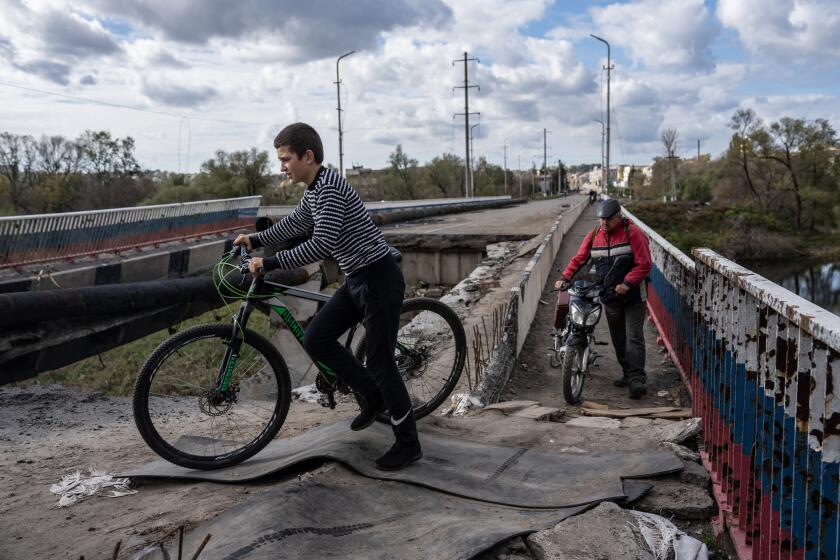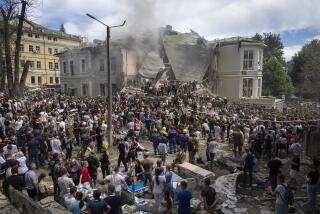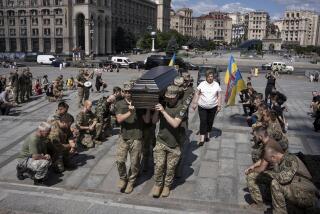Russia unleashes another missile barrage on Ukraine, which shoots down dozens
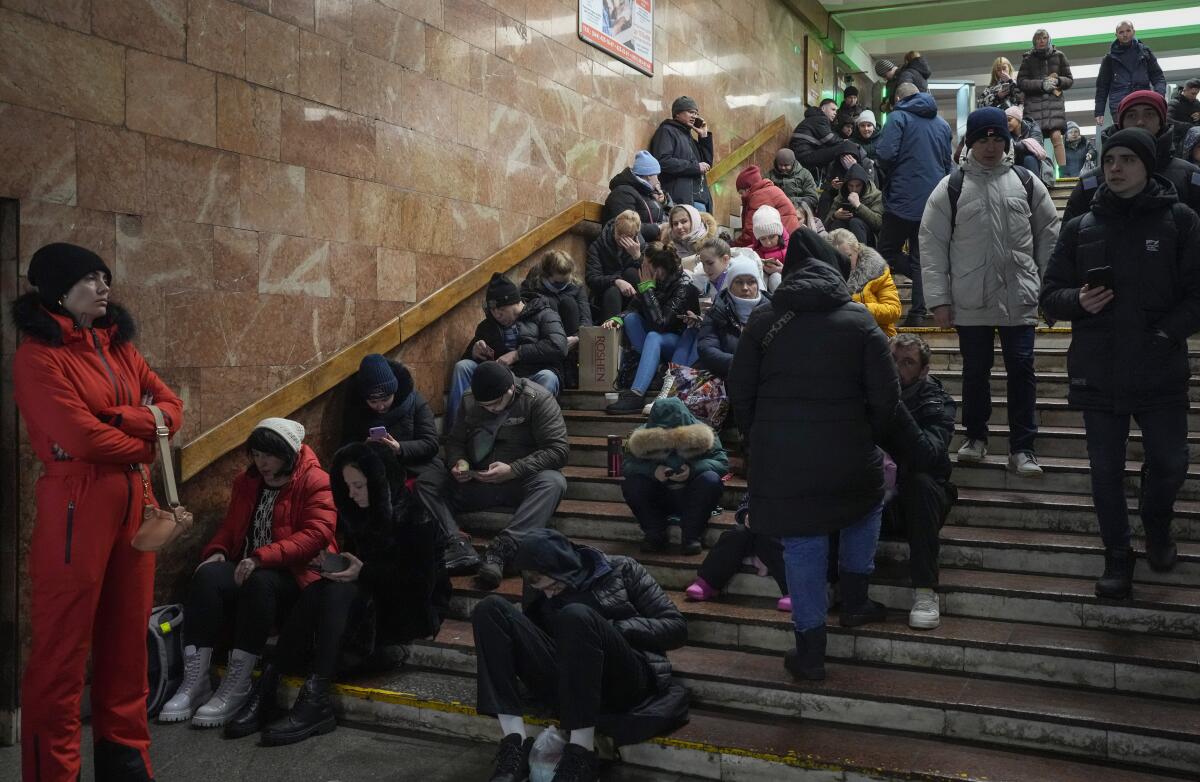
KYIV, Ukraine — Russian forces launched at least 60 missiles across Ukraine on Friday, according to officials who reported explosions in at least four cities, including Kyiv. At least two people were killed by a strike on a residential building in central Ukraine, where a hunt was on for survivors.
Electricity and water services were interrupted in Kyiv and in Kharkiv, Ukraine’s second-largest city. Thousands of people sought shelter in subway stations deep underground during the bombardment.
The Kyiv city administration said the capital had withstood “one of the biggest rocket attacks” launched by Russian forces since they invaded Ukraine nearly 10 months ago. The administration said Ukrainian air defense forces shot down 37 of “about 40” missiles that entered the city’s airspace. One person was injured, it said.
Thudding blasts and gunfire from air-defense systems echoed around the country as authorities on social media reported explosions and missile strikes in Kyiv, Kryvyi Rih in the south, Zaporizhzhia in the southeast and Kharkiv in the northeast. Air-raid alarms warned of a new round of Russian strikes, which have occurred intermittently since mid-October.
Ukrainian air force spokesman Yurii Inhat told Ukrainian TV that more than 60 missiles had been fired by Russian forces, but it wasn’t immediately clear how many missiles the Ukrainian army managed to intercept.
Ihnat said Russia had fired cruise missiles from positions in the Black Sea and used bomber aircraft as part of an effort to “massively distract the attention of the antiaircraft defense, keeping it in tension.”
Amid the nightmare of war in Ukraine, a coffee date leads to love, cohabitation and a baby girl who’s due in January.
At the site of one attempted strike in Kyiv, military commanders told the Associated Press that the city’s territorial defense mobile group had unexpectedly — almost unbelievably — shot down a cruise missile with a machine gun.
“Almost impossible to hit a missile with a machine gun, but it was done,” said a commander who goes by the call sign Hera.
Another commander, a military post chief code-named Yevhen, said the machine gunner who intercepted the missile “reacted quickly” and fired, and green sparks flew from the rocket as it began to spin and tumble to the ground.
A day earlier, Russia’s Foreign Ministry warned that if the U.S. delivers sophisticated Patriot air-defense systems to Ukraine, such systems and any crews who accompany them would be a legitimate target for the Russian military. Washington dismissed the threat.
U.S. officials say the Pentagon will expand military combat training for Ukrainian forces, using the slower winter months to instruct larger units in more complex battle skills.
Analysts have said that Russian strikes targeting energy infrastructure have been part of a new strategy to try to freeze Ukrainians into submission as cold weather sets in after recent battlefield losses by Russian forces. Officials and experts say that the campaign has only strengthened the resolve of Ukrainians to stand up to Russia’s invasion as Moscow tries to buy time for a possible offensive in coming months after the current battlefield stalemate.
In Kryvyi Rih in south-central Ukraine, President Volodymyr Zelensky’s hometown, a missile slammed into a four-story residential building and left a gaping hole in its upper floors, with rubble spilling onto the ground. Two people were killed and at least eight others injured, including three children, regional Gov. Valentyn Reznichenko said.
Rescue teams were combing through the debris in a hunt for survivors or other victims.
Zaporizhzhia was struck by about 15 Russian missiles, regional Gov. Oleksandr Starukh said. He did not specify the location of the strikes but said infrastructure had been damaged.
Breaking News
Get breaking news, investigations, analysis and more signature journalism from the Los Angeles Times in your inbox.
You may occasionally receive promotional content from the Los Angeles Times.
Kharkiv Mayor Igor Terekhov said on Telegram that the city was without electricity. Kharkiv regional Gov. Oleh Sinegubov reported three strikes on the city’s critical infrastructure. Kyiv Mayor Vitali Klitschko reported explosions in at least four districts and urged residents to go to shelters.
“The attack on the capital continues,” he wrote on the social media app. Subway services in the capital were suspended, he said, as city residents flocked to its tunnels to seek shelter.
Ukrzaliznytsia, the national railway operator, said power was out in a number of stations in the eastern and central regions of Kharkiv, Kirovohrad, Donetsk and Dnipropetrovsk because of damage to the energy infrastructure. But trains continued to run by switching from electric power to steam-engine power, which had been readied as a backup.
In neighboring Moldova, the state-owned energy company, Moldelectrica, reported disruptions to its electricity network as a result of Russia’s strikes on Ukraine and warned of a “high risk” of power outages.
A Ukrainian mayor surrendered his city without a fight, but Russian forces still left Kupiansk tortured and destroyed.
Moldova — whose Soviet-era systems remain interconnected with Ukraine’s — has already suffered two massive blackouts in recent months as Russia attacked Ukraine’s energy grid.
The previous such round of massive Russian airstrikes across the country took place Dec. 5. Ukrainian authorities have reported some successes in intercepting and downing incoming missiles, rockets and armed drones.
More to Read
Sign up for Essential California
The most important California stories and recommendations in your inbox every morning.
You may occasionally receive promotional content from the Los Angeles Times.
